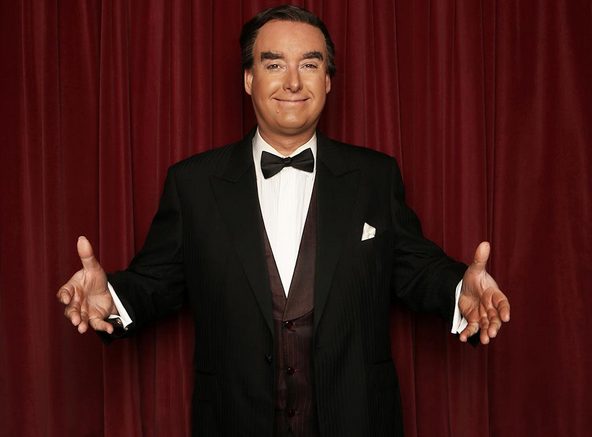A colossus of light entertainment, Bob Monkhouse was rarely off prime-time TV throughout the 70s, 80s and 90s. He was the go-to game show host, the wise-cracking gag merchant – if you needed someone who gave good telly, Bob was your man. Yet along with this polished persona came criticisms like “smarmy”, “cheesy”, “smug”. Until a late period of reappraisal shortly before his death, Monkhouse was successful but not necessarily well liked. At Assembly Hall this August, a comedy drama looks at the life and laughs of this much misunderstood man. We talked to the actor/impressionist Simon Cartwright, whose connection with the comedian was a close one, and who now has the task of playing The Man Called Monkhouse…
Why Bob?
I have had a life-long respect and admiration for Bob Monkhouse. I remember watching him present The Golden Shot in the 1970s and being fascinated by his charisma and professionalism. His ability to own every situation and create a sense of comfort and control intrigued me. He was inspirational and set the showbusiness spark alight for me.
You met Bob impersonating him on his own show, Opportunity Knocks. How was that for you and how did he react?
I remember meeting Bob for the first time in 1989 at the recall auditions for Bob Says Opportunity Knocks. In those days, I had a routine of impressions which ended with Bob. I debated whether or not to include this on the day but plucked up the courage. Bob laughed the loudest and from then on he took me under his wing and helped me improve the impression by giving me masterclasses in his dressing room. I was astonished by his humble and generous approach towards me. I don’t feel unique though, as Bob nurtured any young comedy performer that interested him. I am simply grateful to have had that “opportunity” myself. We maintained an acquaintance for subsequent 18 years before his death in 2003.
Your show looks at some of the lows of Bob’s personal and professional life. How do you think these shaped the man?
This play is most definitely not a “tears-of-a-clown” story. Of course we explore the truth behind his mask. The writer, Alex Lowe, is careful to explore areas of his life that Bob himself shared with the wider public. An emotionally-deprived childhood will naturally shape a person’s life, and for Bob, I guess it was a trigger for why he became a performer. I believe comedy was his lover and he used it as a quasi-therapy. If he could be accepted by an audience and make them laugh, it was the approval and warmth he may have lacked in his earlier life.
Bob said “you do me better than I do” but I’ve heard off camera he could actually do a pretty mean impersonation of himself. Did you see this “behind-the-scenes” Bob? How did it differ and do you think it contributed to public misconceptions about him?
Bob was sharp and observational. He was a very intelligent man who had analysed himself extensively. As he reached the age of 65, he changed dramatically, letting his audience in, “turning honest” as he put it. The play explores the fact that he may have regretted not doing this earlier in life and why his somewhat manufactured television personality divided audiences. I think towards the end of his life, the wider public finally began to accept him and he achieved the affection and respect he had been searching for.
How have audience reactions to your Bob act changed over the years? Has his death made a big difference?
I have been portraying Bob for the past 26 years and I have now moved from an impression to an incarnation. The play is a serious piece of drama and acting the truth about someone’s life is a huge responsibility. Ironically, I bear no physical resemblance to Bob. However, with make-up and costumes we seem to create a fairly convincing representation. I was the voice behind the Prostate Cancer commercial where Bob was brought back to life in 2007. This caused quite a stir in public minds.
What do you think of Bob’s place in the nation’s affections now? Do you think he gets his dues?
There is still a great fascination for Bob and new generations are discovering him on Youtube and retro TV channels. I have just finished recording an episode of Toast of London where Bob is given star billing. The industry continues to hold Bob’s memory in high esteem, but I think the public remain divided, especially those who never saw him in live cabaret. He was simply the best and there will never be another British comedian of his gravitas.
The Man Called Monkhouse is @ Assembly Hall, Edinburgh, from Thu 6 Aug @ 15:15
